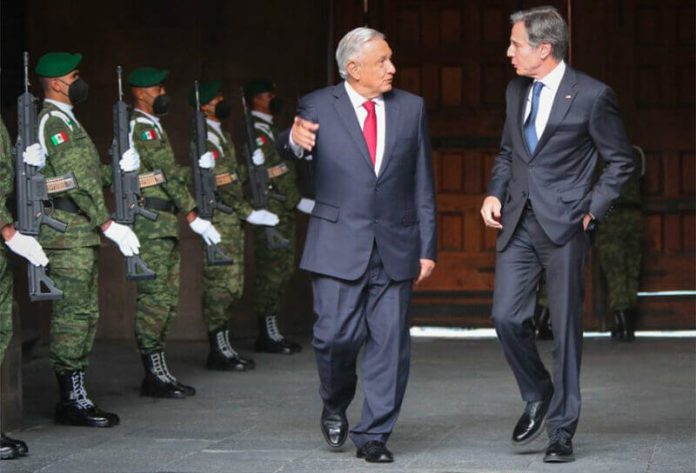Top U.S. and Mexican officials are meeting Friday to try to revitalize a bilateral security relationship that has been blighted by the high-profile arrest of a former Mexican defence minister last year.
Having just sought to patch up relations with France after the fallout from the Aukus submarine deal, Antony Blinken, U.S. secretary of state, is leading the country’s delegation to meet President López Obrador and participate in talks on migration, drug trafficking and criminal justice.
“It’s time for a comprehensive new approach to our security co-operation,” Blinken said in Mexico City on Friday.
The two sides are working on a new, broader framework for security co-operation that will include public health and economic opportunities, though experts said concrete outcomes were unlikely in this first round of discussions.
Some see the mere existence of high-level talks as a step forward for the rocky relationship between the countries, which share a border that is nearly 2,000 miles long.
“The fact that we’re talking again is enormously important, the fact that not a lot will come out of it is secondary,” said Pamela Starr, a professor at the University of Southern California who has advised both the Mexican and U.S. governments on foreign affairs. “Talking and collaborating is the first step to getting stuff done.”
U.S.-Mexico relations grew more fractious under former president Donald Trump, and sustained significant damage last year when U.S. authorities detained Salvador Cienfuegos, a former Mexican defence minister, on drug trafficking charges without tipping off Mexico in advance.
In response, Mexico’s government launched a campaign to have him released, calling the allegations baseless and passed a law limiting the activities of foreign agents on Mexican soil.
The U.S. ultimately relented and dropped the charges, citing “sensitive and important foreign policy considerations.” But when Mexico later published hundreds of pages of evidence from the case, Washington threatened to end criminal co-operation.
Marcelo Ebrard, Mexico’s foreign minister, said this week that the basis for Friday’s dialogue was mutual respect, and that Mexico was now focused on reducing homicides, including stopping the flow of U.S. guns.
“It would be very unfortunate if we didn’t understand each other, if the relationship wasn’t strengthened” López Obrador said at a breakfast on Friday with the U.S. officials.

Alejandro Mayorkas, U.S. homeland security chief, also attended the meeting. Immigration through Mexico has become a political problem for Joe Biden, U.S. president. U.S. authorities’ handling of the arrival of thousands of Haitians migrants who arrived at the border drew condemnation from left and right.
In recent years the U.S. has pushed Mexico to step up enforcement against migrants, including the use of the National Guard and deportation flights. That reliance has made Washington reluctant to criticize López Obrador publicly over other policies, experts said.
“There’s no question in my mind the Biden administration is trying to be as quiet and as diplomatic as they possibly can with López Obrador,” Starr said. “They just don’t have the political space in the United States to lose Mexico’s co-operation on migration.”
The U.S.-Mexico security relationship has long been focused on drug trafficking and related violence. Since 2007, Mexico has seen a surge in its homicide rate, with organized crime infiltrating government, almost 100,000 people missing, and hundreds of thousands displaced from their homes.
López Obrador has taken a less confrontational approach to the country’s drug cartels than his predecessors, in what he calls a “hugs not bullets” strategy. In a seminal moment in 2019, his government released the son of notorious drug trafficker Joaquin “El Chapo” Guzmán not long after capture to avoid civilian deaths.
“There is a strategy to avoid confrontation,” said Romain Le Cour, co-ordinator of the security and violence reduction program at the think tank México Evalúa. “In terms of figures it’s apparently not working, homicide rates are not dropping.”
A cornerstone of the bilateral security relationship has been the Mérida Initiative, a U.S. funding stream that became synonymous with military equipment for Mexico’s war on drugs. Mexico has asked for it to be replaced.
Blinken said Friday that after 13 years of Mérida, it was time for something new to tackle the root causes of the countries’ security problems.
The U.S. state department said on Thursday that it hopes to have a plan by the end of January 2022.
In addition to rising violence, the U.S. has become increasingly concerned over the booming trade for Mexican cartels in synthetic drugs like fentanyl, which kills tens of thousands of people a year in the U.S.
Le Cour is hoping that the dialogue will acknowledge the past failures and look for ways to build public institutions rather than just react to threats.
“There have been billions of dollars poured into the U.S.-Mexico security co-operation, and the situation is not improving in objective terms,” Le Cour said. “On the ground, it’s a total failure honestly.”
© 2021 The Financial Times Ltd. All rights reserved. Please do not copy and paste FT articles and redistribute by email or post to the web.
